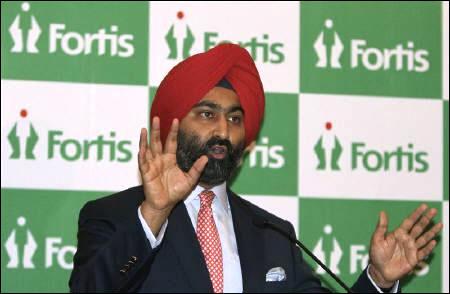 | « Back to article | Print this article |
Fortis injects a dose of movies
The next time you fall sick, and go to a Fortis facility for treatment, you might be able to catch a movie too.
Fortis Memorial Research Institute, Gurgaon, will start screening movies from tomorrow. The non-commercial venture could morph into a potential revenue model. The cinema at Fortis Memorial Research Institute will initially have 36 seats and screen three to four movies daily.
With this, the hospital chain owned by billionaire brothers Shivinder and Malvinder Mohan Singh is moving beyond offering elite food joints, bookstores and mini spas on its premises.
A senior Fortis official said the cinema would be managed internally. "The concept is to provide an ambience to heal. We are trying to create a new era of wellness where, while we medically take care of super-critically ill patients, such services are a means and mechanism to positively distract attendants of patients from the stress and provide them with recreational activities of their choice," the Fortis official said.
If successful, Fortis could build similar movie halls in its other facilities, she added.
Fortis is not the only corporate hospital exploring innovative ways to provide incremental services, primarily for the affluent. Indraprastha Apollo Hospital, for instance, has set up a gift shop and a communication centre customised to cater to its international patients, besides branded food joints. Max Hospital has book stores within its complex. Fortis has mini-spa, a Baskin-Robbins outlet and Australian Joost juice bar.
The attempts are to have special boutique hospitals offering comfort and convenience to people willing to pay. Last year, for instance, Hinduja Group opened a boutique Hinduja Healthcare, Mumbai, with an exclusive 100-bed multispeciality facility. The hospital has chrome fittings, marble floors and LCD TV-equipped rooms. The luxury facility also boasts of a multispeciality unit, five operation theatres, and cardiology, radiology, cath-lab and haematology departments, as well as a 26-bed intensive care unit. Such services are "paid-for".
Experts said though such incremental services might not necessarily generate huge revenue for hospitals, they certainly give the facility an edge.
Deloitte Touche's Senior Director, Strategy and Operations Consulting, Charu Sehgal said: "This primarily means moving to the next level of combining clinical care with additional services because people who can afford it want such luxurious facilities. Apart from earning revenue, such services certainly help hospitals attract high-profile and elite patients."

